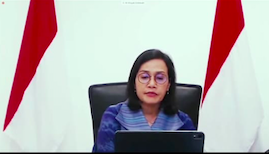Sri Mulyani Talks of Ways to Revive Global Economy at UN
Delli Asterina ~ FEB UI Public Relations Office
Jakarta, 01/07/2020 – Minister of Finance Sri Mulyani Indrawati, Ph.D was one of the speakers at the Rebirthing the Global Economy to Deliver Sustainable Development forum held by the United Nations on Wednesday (01/07) on the UN YouTube account.
She pointed out that the Covid-19 pandemic has changed the lives of many people. The global economy has plunged into a reccesion and a depression could ensue. Economists are concerned that the efforts and achievements made in the last 20-30 years to eradicate poverty and to distribute wealth could become pointless. Indonesia, for example, has suffered a setback by around five years in poverty alleviation because of the pandemic that has affected the country for the last six month.
From the perspective of Sustainable Development Goals (SDGs), the pandemic has killed people, wiped out prosperity and destroyed partnership. How do we promote rebirthing? “Firstly, the pandemic has significantly affected the national economy, causing sources of revenue to shrink, tax income to decline because all economic activities have contracted even as the government needs funds for health and social safety net (Jaring Pengaman Sosial, JPS) spending and a steep increase in stimulus for economic recovery,” she said.
How do we solve this funding problem? “Initially, our budget was expected to suffer a deficit of 1.7% from GDP, very insignificant compared to other countries. However, the pandemic forced us to revise down the deficit to 6.3%, a steep increase. How do we finance the deficit? If a country has a fiscal space, it can use past saving and financing from multilateral institutions,” she said.
She expressed appreciation for various multilateral institutions. However, they are not sufficient. Therefore, developing nations need to find other sources of debts, such as from the local money market, bonds or global bond. The problem is, the interest rates set by global financial institutions are too high for developing or poor nations. She deemed it discriminatory as it does not create equal opportunity for nations to catch up or deal with the pandemis. Thus, access and price are crucial.
She went on to say that the debt dynamics would be very tough for most of the countries in the world. Therefore, the first thing developing and poor nations must do is to use the momentum created by the pandemic to embark on large-scale reform in education, housing, social security or quality spending.
“In my country, if we increase spending, can we really justify it? Is it in the right direction? Is it delivered (to the right recipient) and has a positive impact on people and the economy? That’s quality spending. Policy design in an emergency is very difficult and challenging, but you must give your best,” she stressed.
Secondly, the pandemic has forced people to work from home (WFH), study from home (SFH). The activities can be done online and have proven to be successful. However, the most important thing is whether a country has the digital infrastructure to deal with change and to apply visual business processes. Thus, investing in information technology and digital infrastructure is crucial today and in the future.
Lastly, can the global financial architecture give a good response to the current situation? Many countries are facing a deficit problems with their balance of payments. If these issues are not addressed immediately, the fiscal situation will affect the financial sector, a surge in bad loans (NPL), for example, that can threaten the economic and financial conditions of many countries. In terms of policy response, Indonesia has relaxed banking restructuring rules to help banks deal with the shock.
The Minister of Finance said that the government relaxed regulations, provides subsidy, and restructured debts, with a focus on the grassroots sector, the informal sector, MSMEs and the poor. The government also pays special attention to women who run MSMEs and ultra-micro businesses
“The pandemic hit the grassroots sector, the informal sector, MSMEs, the poor, and women in particular. Therefore, in redesigning rebirthing of the economy, we must pay attention to these issues. Many of our policies favor these groups in the form of subsidy and debt restructuring to help them survive this difficult situation,” she said.
She expected many more pro-women policies, such as in the area of property and land ownership, and access to education.
“I hope there will be more policies, be it housing, education, land ownership reform, and we can have a better perspective of women,” she said. (hjtp)
Source: Kemenkeu.go.id
(lem)

